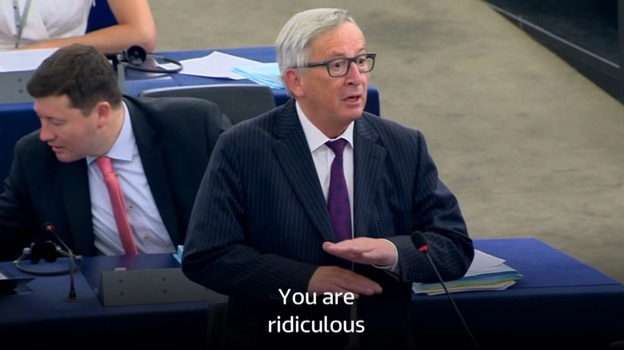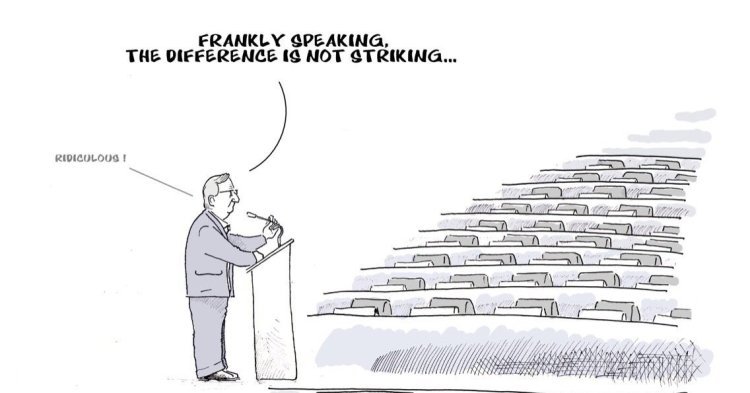Terry REINTKE MEP, who was in the Parliament but not in the plenary explains why:
My usual Strasbourg day starts around seven. First stop is my office for checking emails, preparing the day, going through my agenda. Otherwise, I start the day with breakfast meetings. Like every Tuesday. We meet with the German delegation. Then meetings with journalists about what is on the agenda that week. Discussions with experts on violence against women preparing our groups positioning on the accession to the Istanbul convention.
The belief that Parliamentarians only work when they are sitting in the plenary is simply wrong. But to most of my colleagues (including me) such a work day would actually seem weirdly desirable. Imagining a day sitting in a full plenary from 9 am to 11 pm - with one hour lunch break - listening to debates that in many cases do not directly affect your own work seems quite relaxing.
The day continues: Shadow meeting on the future of cohesion policy. Votes at 12 for an hour. Very often there is no time for proper lunch. Then meeting with the working group on social and employment matters. A very regular topic at the moment: The revision of the Posting of Workers Directive.
When I decided to run for the European Parliament, my main motivation was to change the direction of the European Union. To influence policies to make the EU more socially just, more sustainable and more democratic. In my work as a MEP, I follow this aim when prioritising what I do with my day. Sitting in plenary can be important for it, but certainly not always.
Coffee meeting with the Youth intergroup to coordinate our efforts on the fair internships campaign. Then meeting with a journalist from Italy on the Youth Employment Initiative. Some time in the office to write a Facebook post on the situation of women’s rights in Poland. Phone calls with my staff to organise my travel to the Pride in Istanbul. Then group meeting to discuss a policy paper on defence and security matters. After that back to the office - unless there are additional dinner meetings.
Some people have reacted to this debate by stating that tax payers money is being wasted on lazy MEPs who are not coming to the plenary. I will claim the opposite: Tax payers money is being wasted if all MEPs sit in the chamber all day.
I leave the Parliament in Strasbourg around half past eight on a good day - like most of my colleagues. Always taking a collection of papers I still have to read with me.
A functioning parliament needs time to coordinate, to meet legal experts, to meet citizens, to discuss political strategies, to push its agenda and to debate. And what European citizens need right now - in times of growing inequality, of increasing right-wing populism, are new challenges that need to be met with democratic answers - is a functioning parliament.
If Jean-Claude Juncker calls that ridiculous, I happily disagree with him.
Bruno BOISSIERE, who has an established history of activity in the parliament, had the following to say:
Jean-Claude Juncker is never afraid to speak his mind. Journalists love him for this rare quality. MEPs also like when the elected President of the European Commission does not use the “langue de bois”. But the incident during the July plenary of the European Parliament in Strasbourg signalled a limitations to Juncker’s sharp wit, one that is suddenly less funny if the credibility of the Chamber is in play.

I easily understand why Juncker was angry to find only some 30 MEPs present to hear a report on Malta’s just-completed EU presidency. He has represented Luxembourg in the Council of the EU for over 30 years. By population, Luxembourg is the 27th member state in the EU. Malta is the 28th one. Among other positions in the Parliament, I have been the 2nd Vice-Chair of the EP Delegation to the EU-Malta Joint Parliamentary Committee before Malta was admitted to the EU in 2004. In the joint Committee, I especially dealt with the institutional aspects and constitutional outlooks of “micro-states” like Cyprus, Luxembourg and Malta in the EU. This is why, just like Jean-Claude Juncker and despite my French nationality (we are all Europeans!), I became particularly sensitive to the cause of the smallest member states. Democrats and above all federalists in the EP should show the same respectful attitude towards each presidency of the EU Council. Paraphrasing the clarion call of the Three Musketeers which is also the motto of Switzerland “One for all. All for one!”, one could say that Malta has presided over the Council for all Europeans and that all, at least more than a handful of MEPs should have done their duty by hearing and debating the review of the President-in-Office of the Council and the statement of the European Commission on the Maltese Presidency.
So, there should be no link between the size of the country and the number of MEPs present. Clearly a similar debate with Merkel or Macron, or even Gentiloni would have drawn a much wider turnout. More generally, in a genuine federal system, the directly elected European Parliament should represent the citizens of each member states proportionally to its population. Rightly, the biggest and the smallest countries (in terms of population) should have a slightly “weighted” distribution of seats, as it is now (less for Germany, more for the ‘micro-states’). But in the Council, the principle of “equality of the unequals” should apply, as it is for instance in the USA or Switzerland, but not in the EU… yet! Each member state should have the same treatment not only in terms of respect but most importantly in terms of power. This, independently from the states’ characteristics: small/big, poor/rich, late joiner/founder, Southern/Northern, Eastern/Western, etc.
In practical terms, I’d like to comment on the excuses of MEPs who explained that they cannot be sitting in the plenary “all the time”. What was at stake in Juncker’s statement is not that the MEPs should be listening to all the debates, every day from 9 am until sometimes late in the evening; it was about evaluating the six-month presidency results. Nobody would seriously pretend that an MEP who is competent in the area of Social Affairs, Regional Development, Women’s Rights and Gender Equality, and relations with Montenegro should be all the time present in the chamber and listening to the debates on Constitutional Affairs, Culture and Education, Environment, Fisheries, relations with the Maghreb for instance, and all other policy areas of the EU. Of course not! But the review of the rotating Council presidency deals with its achievements in relation to the political priorities for the semester. And the fact that the MEPs can follow the debates in the plenary on a TV screen from their offices should not be an excuse for only being present in the plenary for signing the presence lists, for a 1 to 5 minute speech and for the votes. If we follow this logic, then the MEPs will be happy enough if the President of the Council remains in his/her country and if they can watch his/her web streamed speech from their office in Strasbourg and even debate with the President online..
Being present in the chamber for the few major debates and the votes cannot prevent the MEPs from fulfilling the rest of their duties during points of the agenda which are less important or not of their relevant field of responsibility. In theory, and I think in practice, other meetings (groups, intergroups, committees, delegations) are forbidden during the most political or solemn sessions. There is a maximum of 43 days of plenary sittings in Strasbourg or Brussels. All the MEPs know that the important debates take place on Tuesdays or Wednesdays in Strasbourg, so that the MEPs can easily plan their presence. Furthermore the official calendar of meetings reserves at least 9 weeks (about once a month) for “external parliamentary activities”. Most of these weeks can be used by the MEPs for their extra-parliamentary work, in addition to all Fridays in the year which are also free of EP meetings. Enough to plan grassroots events without missing an important debate or even important political votes in Strasbourg! Hundreds or thousands of migrants are rescued almost every day in the Mediterranean. The humanitarian NGO’s who are active daily on the ground of course need support, also from the MEPs. I cannot agree more with this. But is it a sufficient excuse for not (sometimes!) fulfilling the primary tasks of an MEP? Is it really what the voters expect from their representatives?
At the end of this debate, I am confident that, beyond our different views on Juncker’s statement on the “ridiculous” Parliament, I could easily find common ground with Terry Reintke on (most of) the ecological, climate, regionalist, European and world federalist, or universal basic income issues, dear to my green heart.
Terry REINKE MEP (Bündnis 90/Die Grünen), from Frauenkirchen, Germany. Terry is a member of the committee on employment and social affairs, committee on regional development, the committee on women’s rights and gender equality, and the Delegation to the EU-Montenegro Association Committee, and a substitute for the Committee on Bosnia and Herzegovina and Kosovo.

Follow the comments: |
|
